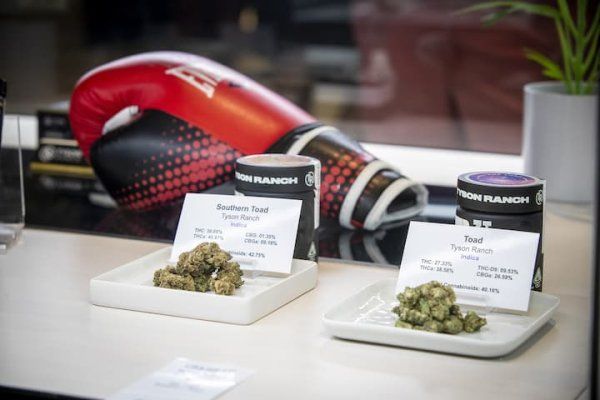With high-profile product launches and collaborations, celebrities like Jay-Z and Justin Bieber are trying to make their mark on the cannabis industry. According to projections from data firm Headset, the pot market will reach $45.8 billion by 2025, proving why they want in.
There is, however, a crowded market for Seth Rogen's prerolled joints and Cann, the THC beverage backed by Gwyneth Paltrow and Rosario Dawson. Their products face tumbling prices, a thriving black market undercutting the legal one, and a patchwork of laws that vary from state to state. Not to mention stalled efforts at federal legalization that limit cannabis companies' access to credit and banking services.
The highly fragmented and still-nascent cannabis market has generated a lot of press, but most celebrity-backed brands haven't become top sellers. Several retailers in states where marijuana has been legal for the longest say celebrity-linked brands have had a hard time competing with labels like Jeeter and Pacific Stone.
As the CEO of TRP, a cannabis retailer with 18 dispensaries in eight states, Daniel Firtel noticed that consumers don't care as much about celebrity endorsements. Most of his company's top-selling brands aren't celebrity-backed.
Similar to Statehouse Holdings Inc., a cannabis company with 14 California stores, celebrity lines haven't disrupted the market.
Nevertheless, celebrities have seen some success. The launch of Martha Stewart's line of CBD products with Canopy Growth had a quick impact, outselling competitors and bringing in new customers, a company spokeswoman said. According to Headset data, Mike Tyson's Tyson 2.0 cannabis line has also done relatively well: The former heavyweight boxer's brand has generated $20.7 million in retail sales since its launch in November 2021.
Despite positive early returns, celebrity-backed lines still need to build a loyal customer base to maintain longevity - a task that has proven difficult in the past. As marijuana is federally illegal, radio advertising is one typical method of accomplishing this, despite the fact that the product is allowed in California, New York, and Illinois.
Death Row Cannabis, for example, has become more creative in reaching potential customers because of marketing restrictions. According to Tiffany Chin, who leads Snoop's cannabis ventures, brands are targeting buyers and budtenders more specifically.
In his opinion, winning over dispensary retail workers can be “very advantageous” for celebrity brands, since they have an “extraordinary” amount of influence over their customers, according to Headset analyst Cooper Ashley. A customer and a budtender make up the majority of cannabis transactions, Ashley said.
Celebrity-backed products, like Firtel and TRP, lack the capital and bandwidth to grow to mainstream levels.
“A rapper, musician, or celebrity might release a strain, and then it’ll get launched, and there’s a little buzz, but then there’s really no follow-up,” Firtel said. It’s because they don’t have the infrastructure, the team and, really, the level of commitment required to operate in cannabis.
There is, however, a crowded market for Seth Rogen's prerolled joints and Cann, the THC beverage backed by Gwyneth Paltrow and Rosario Dawson. Their products face tumbling prices, a thriving black market undercutting the legal one, and a patchwork of laws that vary from state to state. Not to mention stalled efforts at federal legalization that limit cannabis companies' access to credit and banking services.
The highly fragmented and still-nascent cannabis market has generated a lot of press, but most celebrity-backed brands haven't become top sellers. Several retailers in states where marijuana has been legal for the longest say celebrity-linked brands have had a hard time competing with labels like Jeeter and Pacific Stone.
As the CEO of TRP, a cannabis retailer with 18 dispensaries in eight states, Daniel Firtel noticed that consumers don't care as much about celebrity endorsements. Most of his company's top-selling brands aren't celebrity-backed.
Similar to Statehouse Holdings Inc., a cannabis company with 14 California stores, celebrity lines haven't disrupted the market.
Nevertheless, celebrities have seen some success. The launch of Martha Stewart's line of CBD products with Canopy Growth had a quick impact, outselling competitors and bringing in new customers, a company spokeswoman said. According to Headset data, Mike Tyson's Tyson 2.0 cannabis line has also done relatively well: The former heavyweight boxer's brand has generated $20.7 million in retail sales since its launch in November 2021.
Despite positive early returns, celebrity-backed lines still need to build a loyal customer base to maintain longevity - a task that has proven difficult in the past. As marijuana is federally illegal, radio advertising is one typical method of accomplishing this, despite the fact that the product is allowed in California, New York, and Illinois.
Death Row Cannabis, for example, has become more creative in reaching potential customers because of marketing restrictions. According to Tiffany Chin, who leads Snoop's cannabis ventures, brands are targeting buyers and budtenders more specifically.
In his opinion, winning over dispensary retail workers can be “very advantageous” for celebrity brands, since they have an “extraordinary” amount of influence over their customers, according to Headset analyst Cooper Ashley. A customer and a budtender make up the majority of cannabis transactions, Ashley said.
Celebrity-backed products, like Firtel and TRP, lack the capital and bandwidth to grow to mainstream levels.
“A rapper, musician, or celebrity might release a strain, and then it’ll get launched, and there’s a little buzz, but then there’s really no follow-up,” Firtel said. It’s because they don’t have the infrastructure, the team and, really, the level of commitment required to operate in cannabis.




